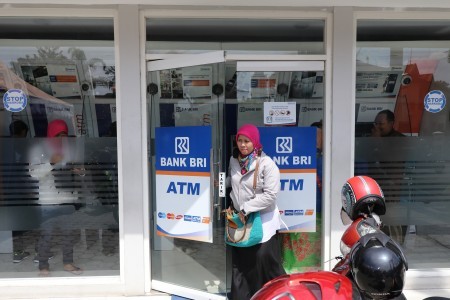Banks face uphill battle following slow performance
Moody’s Investors Service wrote in a research note that the country’s banks would see their asset quality and profitability deteriorate, but their capital and liquidity would remain strong.
Change Size

T
he Indonesian banking industry will face tougher challenges throughout the rest of the year following the sector’s slumping performance in the first quarter as the impacts of COVID-19 continue to batter the economy, experts have said.
Moody’s Investors Service financial institutions group analyst Tengfu Li wrote in a research note dated May 29 that the country’s banks would see their asset quality and profitability deteriorate due to the coronavirus, but their capital and liquidity would remain strong, providing ample buffers to absorb the financial stress.
“Restructured loans in Indonesia have grown significantly since authorities relaxed rules for debt restructuring in March 2020 to provide financial relief for those impacted by the crisis,” Li said.
“And while this, along with subsidies for consumers and small businesses, will provide temporary relief for banks, nonperforming loans (NPLs) will still increase substantially in the longer term, given the scope of economic disruptions stemming from the coronavirus crisis.”
Read also: Ultra-rich to place more funds in banks amid liquidity crunch: Economists
The coronavirus outbreak has disrupted economic activity as it forces offices, businesses and schools to shut down amid social restrictions implemented by the government to contain the disease. It has also affected people’s purchasing power as millions have lost their jobs.
The Financial Services Authority (OJK) issued a regulation allowing businesses hit by the pandemic to apply for loan restructuring in an effort to minimize bad credit. The banking industry recorded Rp 517.2 trillion (US$36.5 billion) in loan restructuring from 5.33 million debtors as of May 26, OJK data show.
NPLs slightly increased to 2.89 percent in April, two months after the government announced Indonesia’s first two cases of COVID-19 in early March, versus 2.77 percent at the end of the first quarter. Loan growth slowed to 5.73 percent year-on-year (yoy) in April from 7.95 percent recorded at the end of the first quarter.
Banks’ profitability would also deteriorate materially because of increasing credit costs, as they continued to proactively identify weak borrowers and increased provisions for them, Li of Moody’s said. Meanwhile, interest margins would contract because of low interest rates and slowing loan growth, further pressuring profitability.
“[The loan restructuring] could cause banks’ revenue to decline, thus affecting their profits,” Samuel Sekuritas equity analyst Suria Dharma told The Jakarta Post on Wednesday. “I even expect some big banks will even see contractions in their profit growth this year.”
One of the country’s largest bank by asset value, state-owned Bank Rakyat Indonesia (BRI), saw its net profit contract 0.3 percent in the first three months of the year to Rp 8.17 trillion as its loan disbursement grew slower at 10.1 percent yoy compared to 18.6 percent yoy in the first quarter of 2019.
Read also: Indonesian banks have sufficient liquidity despite loan restructuring, pandemic: Economists
“We will definitely revise our bank business plan this year [given the situation],” finance director Haru Koesmahargyo said during a virtual press briefing on May 14.
State-owned Bank Tabungan Negara (BTN), meanwhile, recorded a contraction of 36.79 percent in profit to Rp 457 billion in the first quarter, while its NPL ratio jumped to 4.91 percent from 2.92 percent.
State-owned Bank Negara Indonesia (BNI) recorded a 4.3 percent growth in profit to Rp 4.25 trillion in the first three months of the year. Bank Mandiri has yet to announce its first quarter financial report.
Bank Central Asia (BCA), the country’s biggest privately owned bank, also saw slowing growth in profit and loan disbursement in the first three months of the year.
During the period, BCA recorded annual profit growth of 8.6 percent to Rp 6.58 trillion, slower than the 10.1 percent growth booked in the first quarter of last year. It also only recorded 12.3 percent yoy growth in loan disbursement, compared to 13.2 percent yoy growth a year before.
Privately owned Bank OCBC NISP, too, endured a similar fate as its profit only grew 3 percent yoy to Rp 791 billion in the first quarter, much slower than the growth during the same period in 2019 of 14 percent annually.
Despite booking higher growth in loan disbursement, publicly listed Bank Permata’s profit contracted by 99.5 percent yoy during the period to Rp 2 billion.
As a result, investors dumped banking stocks. Finance stocks at the Indonesia Stock Exchange (IDX) have lost more than 24 percent of their value so far this year, the fourth-worst performer among all sectors, while the main gauge, the Jakarta Composite Index (JCI), shed 21.57 percent of its value during the period, data from the bourse show.
Read also: Indonesia’s financial system at risk amid pandemic: KSSK
Although this year’s economic conditions might not be favorable for banks, Suria said banking stocks were still attractive as the recent market rout had significantly lowered bank stocks’ valuation, making them inexpensive when compared to their business potentials.
“This is a great time for mid-to-long term investors to buy the stocks while they are very cheap,” he said.
Moody’s also offered a brighter view over the industry, saying Indonesian banks’ capitalization and liquidity would remain strong despite the challenges ahead.
“A slowdown in capital consumption due to slowing loan growth coupled with rising loan-loss provisions will provide banks with ample buffers against potential losses caused by the coronavirus outbreak,” Li wrote.









